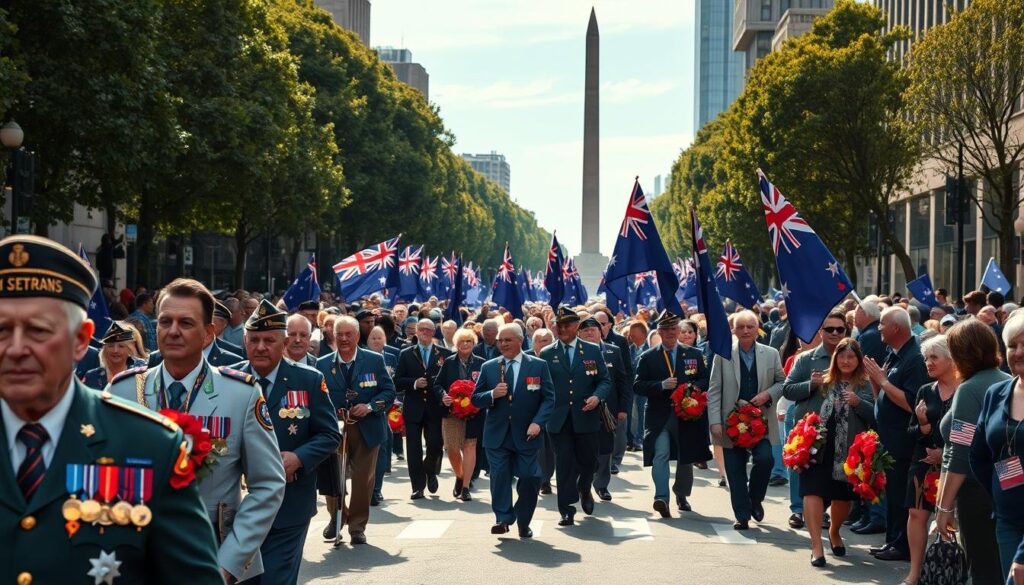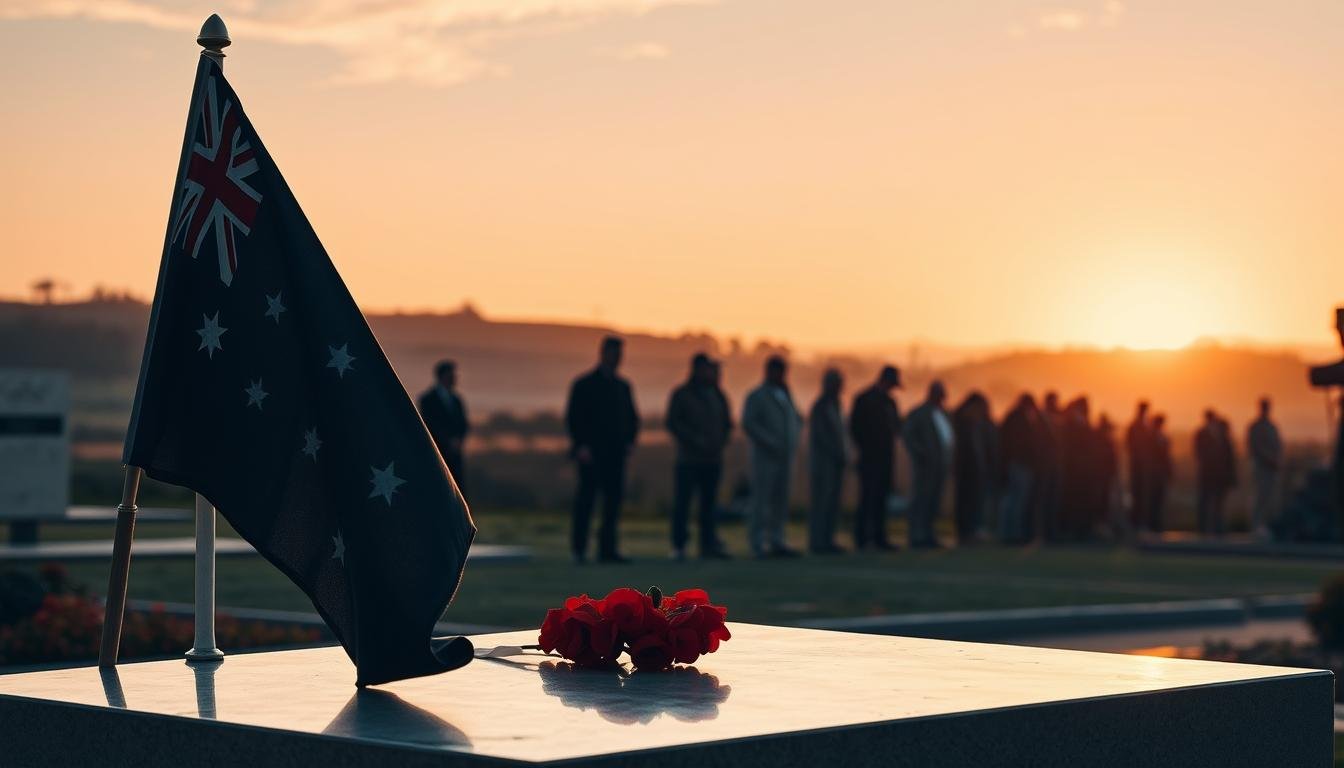Have you ever wondered about ANZAC Day in Australian culture? It’s celebrated on April 25th. This day remembers the Australian and New Zealand Army Corps’ landing at Gallipoli in World War I.
ANZAC Day is more than a holiday. It’s a tribute to the brave men and women who served their country. The story of ANZAC Day is a key part of Australian identity and culture.
Learning about this day’s traditions and meaning shows its importance in Australian culture. It represents the country’s history, sacrifices, and the unity of its people.
Contents
- 1 The Origins of ANZAC Day
- 2 The Historical Significance of April 25th
- 3 Why Australians Celebrate ANZAC Day: National Identity and Remembrance
- 4 ANZAC Day Traditions and Ceremonies
- 5 Symbols and Customs of ANZAC Day
- 6 Evolution of ANZAC Day Commemorations
- 7 International Recognition of ANZAC Day
- 8 Conclusion: The Enduring Legacy of ANZAC Day
- 9 FAQ
- 9.1 What is ANZAC Day?
- 9.2 Why is ANZAC Day celebrated on April 25th?
- 9.3 What is the significance of the dawn service on ANZAC Day?
- 9.4 What are some common symbols associated with ANZAC Day?
- 9.5 How is ANZAC Day observed in Australia?
- 9.6 Is ANZAC Day only observed in Australia?
- 9.7 What values are represented by ANZAC Day?
- 9.8 How has the commemoration of ANZAC Day evolved over time?
The Origins of ANZAC Day
ANZAC Day comes from the Gallipoli Campaign of World War I. This campaign was a failed attempt by the Allied Forces, including Australia and New Zealand. They tried to take the Dardanelles from the Ottoman Empire.
Allied Forces and the Ottoman Empire
The Allied Forces started a naval attack on the Dardanelles in February 1915. But, they couldn’t get past the Ottoman defenses. So, they decided to send troops to the Gallipoli Peninsula.
Australian and New Zealand Army Corps (ANZAC)
On April 25, 1915, the Australian and New Zealand Army Corps (ANZAC) landed on the Gallipoli Peninsula. Despite tough resistance, the ANZAC troops showed great courage and strength.
Courage Under Adversity
The bravery and sacrifice of the ANZAC troops during the Gallipoli Campaign are unforgettable. They left a lasting mark in Australian and New Zealand history.
| Event | Date | Outcome |
|---|---|---|
| Allied Forces Naval Assault | February 1915 | Failed to break through Ottoman defenses |
| ANZAC Landing on Gallipoli | April 25, 1915 | Fierce resistance, significant casualties |
The Historical Significance of April 25th
For Australians, April 25th is a day filled with deep historical meaning. It marks the start of their national identity. The events of April 25, 1915, during World War I, are unforgettable. Australian and New Zealand troops landed on the Gallipoli Peninsula that day.
This day is now known as ANZAC Day. It’s a day to remember the bravery and sacrifice of those troops.
The ANZAC troops showed great courage, mateship, and sacrifice. These values are still honored today. ANZAC Day is a key part of Australian heritage.
| Values Represented | Description |
|---|---|
| Courage | The bravery shown by ANZAC troops during difficult times. |
| Mateship | The camaraderie and support among the troops. |
| Sacrifice | The ultimate sacrifices made by the soldiers for their country. |
Exploring April 25th’s historical significance shows why ANZAC Day is important. It’s a day to remember and reflect for Australians. The commemoration honors the country’s history and the values of its people.
Why Australians Celebrate ANZAC Day: National Identity and Remembrance
ANZAC Day shows the Australian spirit, with values like mateship and resilience. It’s a day for Australians to honor their veterans. This strengthens the nation’s identity and remembrance.
Mateship and Resilience
The core of ANZAC Day is mateship, which means being there for each other. This bond was formed in World War I. It’s a key part of Australian identity.
Australian soldiers’ bravery is also celebrated. Their ability to overcome tough times is remembered and honored.
ANZAC Day is special in Australia and New Zealand. Yet, it’s similar to American Memorial Day in spirit. Both days remember the sacrifices of military families and personnel.
They highlight courage, sacrifice, and loyalty. These values show the importance of remembrance worldwide.
By celebrating ANZAC Day, Australians honor their veterans. They also reaffirm their national identity. This identity is based on mateship, resilience, and remembrance.
ANZAC Day Traditions and Ceremonies
ANZAC Day is a time to remember in Australia. It’s marked with solemn ceremonies across the country. The dawn service, at 5:30 AM, is especially important. It honors the early morning landing at Gallipoli.
The dawn service is a moving event. It includes laying wreaths, reading the Ode of Remembrance, and a minute of silence. Dawn is chosen to remember the ANZAC troops’ sacrifices.
ANZAC Day ceremonies have key elements:
- The dawn service, a solemn and reflective ceremony
- The laying of wreaths to honor the fallen
- The reading of the Ode of Remembrance
- A minute of silence to reflect on the sacrifices made
These traditions highlight ANZAC Day’s importance in Australian culture. They mark a day of national remembrance and reflection. By joining or attending these ceremonies, you’ll learn more about the values and history they represent.
Symbols and Customs of ANZAC Day
ANZAC Day is filled with symbols and customs that honor Australian veterans. The rosemary worn by participants is a poignant reminder of remembrance and respect. The poppy also holds great significance, symbolizing the sacrifices made by soldiers in war.
Ceremonies on ANZAC Day are rich in tradition. They include the Last Post and the Ode of Remembrance. These customs connect us to the past and honor the sacrifices of Australian veterans. Attending these ceremonies is a powerful way to understand ANZAC Day’s significance.
The symbols and customs of ANZAC Day highlight its importance in Australian culture. They honor the nation’s war heroes and remind us of courage, sacrifice, and camaraderie. By understanding these symbols and customs, you’ll appreciate ANZAC Day’s lasting legacy even more.
Evolution of ANZAC Day Commemorations
ANZAC Day commemorations have changed a lot over time. They reflect how society’s views have shifted. This change is due to historical events and cultural changes.

The ceremonies and traditions of ANZAC Day have also changed. They now include new elements while keeping the core spirit of remembrance. There’s a debate about whether it glorifies war or honors sacrifices.
Debates About Glorification vs. Commemoration
Some people think ANZAC Day has become too focused on the military. Others see it as a day to remember the sacrifices of veterans. This shows the complexity of ANZAC Day commemorations.
| Aspect | Past | Present |
|---|---|---|
| Ceremonies | Primarily focused on military aspects | Incorporates broader themes of remembrance and sacrifice |
| Traditions | Traditional dawn services and marches | Expanded to include community events and educational programs |
The evolution of ANZAC Day shows Australia’s changing views on war and remembrance. Exploring this evolution helps us understand the complexities of ANZAC Day commemorations.
International Recognition of ANZAC Day
ANZAC Day is celebrated around the world, especially in countries with ties to Australia. It’s recognized globally, especially in places with a shared military history with Australia.
In the United States, ANZAC Day events are held every year. These events remember the sacrifices of World War I and II. They also highlight the strong bond between the U.S. and Australia.
ANZAC Day Events in the United States
In the U.S., ANZAC Day is marked at Australian embassies and war memorials. For example, the Australian Embassy in Washington, D.C., holds a ceremony. It includes a dawn service, wreath-laying, and other tributes to honor fallen soldiers.
These events honor Australian and New Zealand soldiers who fought in wars. They also show the lasting friendship and cooperation between nations.
Conclusion: The Enduring Legacy of ANZAC Day
Reflecting on ANZAC Day shows its deep impact on Australian culture and identity. It’s not just a holiday; it’s a celebration of the nation’s values and history. The enduring legacy of ANZAC Day highlights Australia’s bravery, mateship, and resilience.
ANZAC Day reminds us of the sacrifices made by those who served. It has grown over time, adding traditions and ceremonies to honor history. Australians observing ANZAC Day reaffirm their national identity and shared values.
The legacy of ANZAC Day is complex, showing the sacrifices of veterans and the nation’s history. Understanding this day’s significance helps us value remembrance. It shapes Australian identity.
FAQ
What is ANZAC Day?
ANZAC Day is a national holiday in Australia and New Zealand. It honors the Australian and New Zealand Army Corps (ANZAC) landing at Gallipoli in World War I.
Why is ANZAC Day celebrated on April 25th?
It’s celebrated on April 25th because it’s the anniversary of the ANZAC troops’ landing at Gallipoli in 1915.
What is the significance of the dawn service on ANZAC Day?
The dawn service is a solemn ceremony. It remembers the early morning landing at Gallipoli, honoring the ANZAC troops’ sacrifices.
What are some common symbols associated with ANZAC Day?
Symbols include rosemary for remembrance and the poppy for sacrifice.
How is ANZAC Day observed in Australia?
In Australia, it’s marked with dawn services, marches, and wreath-laying. These honor Australian veterans’ sacrifices.
Is ANZAC Day only observed in Australia?
No, it’s also celebrated in New Zealand and countries with ties to Australia, like the United States. Events are held at Australian embassies or war memorials.
What values are represented by ANZAC Day?
It represents courage, mateship, and sacrifice. These values are key to Australian culture and identity.
How has the commemoration of ANZAC Day evolved over time?
Over time, it has changed to reflect new views on war and remembrance. There’s debate on whether to glorify war or honor sacrifice.

Hi, I’m bristly khatun from Bangladesh. I housewife and started a website. I love traveling around Australia. On HaleBoop.com, I share my simple travel stories and experiences from all over the country.
